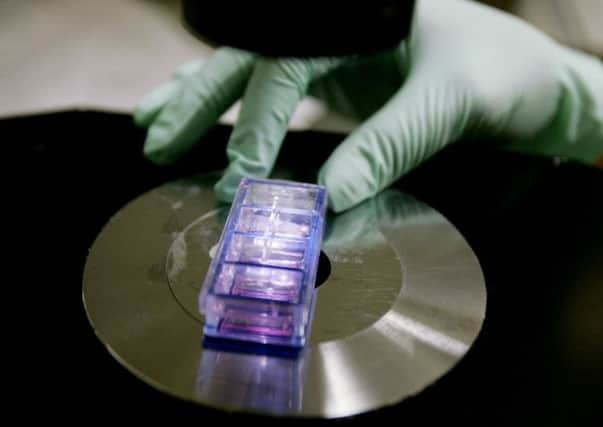Double treatment breakthrough for breast cancers


A study funded by the Breast Cancer Campaign found a molecule called alpha v beta 6 was fundamental in how tumours were able to grow and spread, endangering other body parts.
The researchers said this provided them with a new target for treating one of the most aggressive types of breast cancer.
Advertisement
Hide AdAdvertisement
Hide AdAround one in five breast cancers – 10,000 cases per year in the UK – are known as HER2-positive, a particularly aggressive type of the disease in which increased levels of the HER2 protein give cancer cells the ability to grow and spread.
Currently, the “first-line” treatment for patients with HER2-positive breast cancer is the drug Herceptin, which blocks growth signals from the HER2 protein to stop the cancer cells growing and spreading.
But it is estimated that up to 70 per cent of patients either do not respond to Herceptin, or develop a resistance to the therapy – leaving up to 7,000 women in the UK every year with limited treatment options.
The results of the new study, led by Dr John Marshall at Queen Mary University of London’s Barts Cancer Institute, and published in the Journal of the National Cancer Institute, found that high levels of alpha v beta 6 in a breast tumour could be used to identify patients with poor survival rates and who have a higher risk of developing secondary tumours.
But importantly, the findings also showed that alpha v beta 6 was a viable target for new antibody therapies.
Researcher Dr Kate Moore said an experimental compound called 264RAD, which targeted alpha v beta 6, had been shown to reduce tumour size and spread in previous studies, but had not been tested in combination with other drugs.
“We found that simultaneously targeting alpha v beta 6 and HER2 in mice, with tumours grown from human breast cancer cells, greatly improved the effectiveness of Herceptin – even eliminating tumours that did not respond to Herceptin alone, which could have the potential to improve treatments for patients with these highly aggressive cancers,” she added.
The relevance of alpha v beta 6 – part of a family of proteins known as integrins – in breast cancer has not been previously known.
Advertisement
Hide AdAdvertisement
Hide AdThe researchers came to their conclusions by analysing breast cancer samples from more than 2,000 patients and found that while normal breast tissue contained no trace of alpha v beta 6, high levels were found in 40 per cent of tumours from HER2-positive patients, and this was associated with poor survival.
Breast Cancer Campaign chief executive Baroness Delyth Morgan said: “There is a desperate need for drugs which work in new ways to give the thousands of women diagnosed with HER2-positive breast cancer the best possible chances.”